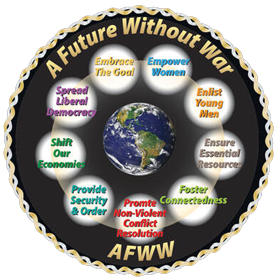Mission Statement |
|
- Home
-
Overview
- Study Guide
- The Single Most Important Idea
- Mission Statement
- War Is Not Inevitable keynote speech
- Capstone Essay: "To Abolish War"
- An Action Plan
- The Nine Cornerstones
- How Far We Have Already Come
- The Secret Ingredient
- The Vision Thing
- How Long It Will Take
- What You Can Do
- The AFWW Logo Explained
- Examples of War Expenses
- Biological Differences
- What Makes People Happy
- Map of Non-warring Cultures
- Cornerstones
- Videos
- Books
- Blog
- Project Enduring Peace
- About
- Related Projects
- Contact
Can humans create a future without war?

Research in evolutionary biology and cultural anthropology says that we can.
Thus the mission of A Future Without War is to challenge the mistaken belief that an endless cycle of wars is inevitable and convince a critical mass of leaders, opinion makers, and citizens that change is possible, to promote an historic shift away from win-lose strategies settled by killing and destruction to uncompromising use of win-win conflict resolution.
Our mission is premised on the following two truths:
The goals of A Future Without War consequently are:
Thus the mission of A Future Without War is to challenge the mistaken belief that an endless cycle of wars is inevitable and convince a critical mass of leaders, opinion makers, and citizens that change is possible, to promote an historic shift away from win-lose strategies settled by killing and destruction to uncompromising use of win-win conflict resolution.
Our mission is premised on the following two truths:
- Ending the practice of war will require that humanity makes a paradigm shift from what can be called a domination mode of conflict resolution(1) to what can be called an egalitarian mode of conflict resolution(2). Our dominant world cultures currently operate on a domination model and accept war as legitimate (albeit unfortunate).
- To accomplish this paradigm shift will require: leaders who embrace the goal of ending war and are motivated to facilitate and guide the process of change, and a critical mass of citizens around the globe who staunchly support such leaders.
The goals of A Future Without War consequently are:
- To reach directly the ears and hearts of women and men who could be those historic leaders. To show them why it is possible to end war, what we would have to do to accomplish this goal, and how quickly the change might occur from the time we embrace the goal.
- To reach the public who must support those leaders with this same information by skillful use of communication media: e.g., internet, video, books, movies.
- To reach out to and convince opinion makers—media people, academics focused on conflicts and their resolution, religious leaders, high profile personalities—so that they, in turn, can influence potential leaders and supporters of this great cultural shift to nonviolent conflict resolution.
(1) Domination mode of conflict resolution - in game theory, this is called win/lose resolution. There is a struggle and in the outcome, one opponent dominates (wins) and the other submits (loses). In the case of war, this means two or more groups take up weapons and reach an outcome through killing.
(2) Egalitarian mode of conflict resolution - in game theory, this is called win/win resolution. There is a struggle and in the outcome, both opponents get "what they need" but not always all of what they want, and the means used are nonviolent - e.g., tools such a negotiation, mediation, compromise, diplomacy. It is considered "egalitarian" by A Future Without War because the opponents recognize each other as having legitimate interests and are viewed more as an equal to keep on friendly, or at least non-hostile terms, rather than a less-than-equal (or evil) opponent that must be vanquished or subordinated.
(2) Egalitarian mode of conflict resolution - in game theory, this is called win/win resolution. There is a struggle and in the outcome, both opponents get "what they need" but not always all of what they want, and the means used are nonviolent - e.g., tools such a negotiation, mediation, compromise, diplomacy. It is considered "egalitarian" by A Future Without War because the opponents recognize each other as having legitimate interests and are viewed more as an equal to keep on friendly, or at least non-hostile terms, rather than a less-than-equal (or evil) opponent that must be vanquished or subordinated.
A Future Without War
Believe in it. Envision it. Work for it.
And we will achieve it.
Believe in it. Envision it. Work for it.
And we will achieve it.
AFWW is continually developed and maintained by Writer and Evolutionary Biologist Dr. Judith Hand.
Earth image courtesy of the Image Science & Analysis Laboratory, NASA Johnson Space Center. Photo Number AS17-148-22727 eol.jsc.nasa.gov
©2005-2019 A Future Without War. All rights reserved. Login
Earth image courtesy of the Image Science & Analysis Laboratory, NASA Johnson Space Center. Photo Number AS17-148-22727 eol.jsc.nasa.gov
©2005-2019 A Future Without War. All rights reserved. Login
- Home
-
Overview
- Study Guide
- The Single Most Important Idea
- Mission Statement
- War Is Not Inevitable keynote speech
- Capstone Essay: "To Abolish War"
- An Action Plan
- The Nine Cornerstones
- How Far We Have Already Come
- The Secret Ingredient
- The Vision Thing
- How Long It Will Take
- What You Can Do
- The AFWW Logo Explained
- Examples of War Expenses
- Biological Differences
- What Makes People Happy
- Map of Non-warring Cultures
- Cornerstones
- Videos
- Books
- Blog
- Project Enduring Peace
- About
- Related Projects
- Contact
